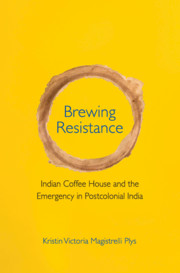Book contents
- Frontmatter
- Contents
- Acknowledgements
- 1 Introduction
- 2 How Anti-Colonial Labour Movements Create Anti-Authoritarian Autonomous Zones
- 3 Indira Gandhi’s Political Economy of Development
- 4 Social Movements of the 1970s
- 5 Emergency at Midnight
- 6 The Coffee House Movement
- 7 ‘Coffee House’ Workers’ Anti-Colonial Labour Movement
- 8 Conclusion
- Appendix I Photographs
- Appendix II Political Parties during the Emergency
- Appendix III Methodological Appendix
- Bibliography
- Index
5 - Emergency at Midnight
Published online by Cambridge University Press: 12 May 2020
- Frontmatter
- Contents
- Acknowledgements
- 1 Introduction
- 2 How Anti-Colonial Labour Movements Create Anti-Authoritarian Autonomous Zones
- 3 Indira Gandhi’s Political Economy of Development
- 4 Social Movements of the 1970s
- 5 Emergency at Midnight
- 6 The Coffee House Movement
- 7 ‘Coffee House’ Workers’ Anti-Colonial Labour Movement
- 8 Conclusion
- Appendix I Photographs
- Appendix II Political Parties during the Emergency
- Appendix III Methodological Appendix
- Bibliography
- Index
Summary
This was not a first journey.
But how disturbing
that moment
after midnight
—Mrityubodh, Disturbing Moment (trans. from Punjabi)In the previous chapter, I examined the Bihar Movement along with other social movements of the early 1970s that have often been blamed for the imposition of Emergency. While the Bihar Movement was certainly effective in articulating a more just and equal vision for politico-economic development in India, it was not until the Allahabad Ruling that Indira Gandhi began speaking about this social unrest as such an extreme threat to the state that it warranted the imposition of Emergency. If social unrest was truly the principal threat to law and order, Emergency should have been imposed nearly a year before, in 1974, when the Bihar Movement was at its peak, producing protests on student campuses across Bihar that were met with state violence which killed many students. The year 1974 was also the height of the Railway Workers’ Strike, which similarly provoked significant state violence and brutal repression. By the time of the Allahabad Ruling, the Bihar Movement had become more peaceful in its tactics and approach, and the railway workers had long since accepted defeat. In the several months leading up to the imposition of Emergency, the Bihar Movement had not employed violent tactics. In the weeks leading up to the Emergency, Jayprakash Narayan (JP) led several public rallies in Delhi in which he read poems that could be interpreted as critiques of the state but certainly no protests that led to violence against persons or property. The historical evidence lends more credence to the interpretation that Gandhi was responding to an attempt to oust her from office on corruption charges by suspending democracy and taking state power rather than the interpretation that she was simply reacting to violent social protest that threatened the existence of the state. While the Bihar Movement and other attendant social movements may have provided an official justification for the imposition of Emergency, the declaration of Emergency did not occur until there was a real threat that risked removing Gandhi from office.
- Type
- Chapter
- Information
- Brewing ResistanceIndian Coffee House and the Emergency in Postcolonial India, pp. 131 - 169Publisher: Cambridge University PressPrint publication year: 2020



